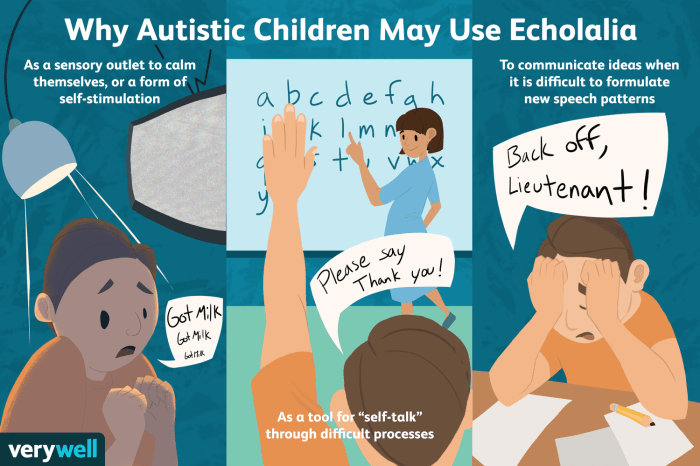Is mimicking accents a sign of autism – Mimicking accents is a common behavior observed in individuals with autism spectrum disorder (ASD). This behavior can range from imitating regional accents to foreign languages or even fictional characters. Understanding the prevalence, types, and impact of accent mimicking is crucial for professionals and caregivers supporting individuals with ASD.
Research suggests that accent mimicking is prevalent among individuals with ASD, with varying degrees of severity. Factors such as echolalia and sensory sensitivities may contribute to this behavior. Additionally, individuals with ASD may mimic accents as a way to connect with others or to self-regulate.
Prevalence of Accent Mimicking in Autism

Accent mimicking is a common behavior among individuals with autism spectrum disorder (ASD). Studies suggest that approximately 10-25% of individuals with ASD exhibit accent mimicking.
Factors that may contribute to accent mimicking in ASD include:
- Echolalia: The repetition of words or phrases, which can include accents.
- Sensory sensitivities: Certain accents may provide sensory stimulation that is calming or enjoyable for individuals with ASD.
Types of Accents Mimicked
Individuals with ASD may mimic a wide range of accents, including:
- Regional accents: Accents from specific geographical areas, such as British, American, or Australian.
- Foreign accents: Accents from other countries or languages, such as French, Spanish, or Chinese.
- Fictional accents: Accents from characters in movies, TV shows, or books.
The reasons why certain accents may be more commonly imitated than others are not fully understood, but it may be related to the individual’s interests, sensory preferences, or social environment.
Impact of Accent Mimicking on Social Interactions
Accent mimicking can have a significant impact on social interactions for individuals with ASD. It may:
- Impair communication: If the accent is not easily understood by others, it can lead to misunderstandings and communication difficulties.
- Affect relationships: Accent mimicking may be perceived as odd or unusual by others, which can lead to social isolation or bullying.
- Impact self-perception: Individuals with ASD who engage in accent mimicking may feel self-conscious or embarrassed about their behavior.
Diagnostic Considerations

Accent mimicking can be considered a symptom of ASD in certain cases. However, it is important to differentiate between accent mimicking as a sign of ASD and other conditions, such as:
- Language disorders: Individuals with language disorders may have difficulty producing or understanding speech, which can lead to accent mimicking.
- Cultural influences: In some cultures, it is common for individuals to adopt or imitate accents from other cultures, which may not be indicative of ASD.
Therapeutic Approaches: Is Mimicking Accents A Sign Of Autism
There are a number of therapeutic approaches that can help address accent mimicking in individuals with ASD. These include:
- Social skills training: Teaching individuals with ASD appropriate social behaviors, including how to interact with others without mimicking accents.
- Speech therapy: Working with a speech therapist to improve speech production and reduce accent mimicking.
- Other interventions: Medication, sensory integration therapy, and cognitive behavioral therapy may also be beneficial in reducing accent mimicking.
Cultural Considerations

Cultural factors can influence accent mimicking in individuals with ASD. In some cultures, accent mimicking may be more common or acceptable than in others.
Cultural norms and expectations can shape the way accent mimicking is perceived and addressed. For example, in some cultures, accent mimicking may be seen as a sign of respect or admiration, while in others it may be seen as disrespectful or inappropriate.
Case Studies

Case studies of individuals with ASD who exhibit accent mimicking provide valuable insights into the specific characteristics and challenges associated with this behavior.
For example, one case study describes a 12-year-old boy with ASD who exhibited a strong British accent despite living in the United States. The boy had a fascination with British culture and would often watch British movies and TV shows.
His accent mimicking was seen as a way to connect with his interests and express his individuality.
Future Research Directions
Further research is needed to explore the underlying mechanisms, prevalence, and impact of accent mimicking in autism.
Areas for future research include:
- Investigating the neurological basis of accent mimicking in ASD.
- Examining the prevalence of accent mimicking in different populations of individuals with ASD.
- Exploring the impact of accent mimicking on social interactions, communication, and self-perception.
Commonly Asked Questions
What are the different types of accents that individuals with autism may mimic?
Individuals with autism may mimic various accents, including regional accents, foreign accents, and fictional accents.
How can accent mimicking impact social interactions for individuals with autism?
Accent mimicking can affect communication, relationships, and self-perception in individuals with autism, potentially leading to misunderstandings and social difficulties.
What are some therapeutic approaches that can help address accent mimicking in individuals with autism?
Therapeutic approaches include social skills training, speech therapy, and other interventions that aim to reduce accent mimicking and improve overall communication skills.